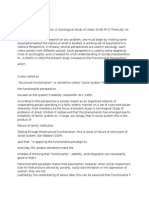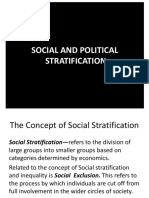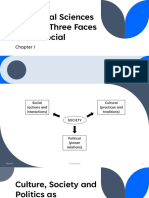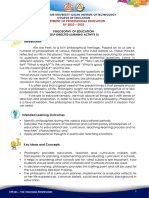Human Society
Human Society
Uploaded by
Jasmine Soriano HanschkeCopyright:
Available Formats
Human Society
Human Society
Uploaded by
Jasmine Soriano HanschkeCopyright
Available Formats
Share this document
Did you find this document useful?
Is this content inappropriate?
Copyright:
Available Formats
Human Society
Human Society
Uploaded by
Jasmine Soriano HanschkeCopyright:
Available Formats
HUMAN SOCIETY A society, or a human society, is a group of people related to each other through persistent relations, or a large social
grouping sharing the same geographical or virtual territory, subject to the same political authority and dominant cultural expectations. Human societies are characterized by patterns of relationships (social relations) between individuals who share a distinctive culture and institutions; a given society may be described as the sum total of such relationships among its constituent members. In social sciences, a society invariably entails social stratification and/or dominance hierarchy.
Society 1.an organized group of persons associated together forreligious, benevolent, cultural, scientific, political, patriotic,or other purposs. 2.a body of individuals living as members of a community;community. 3.the body of human beings generally, associated or viewed asmembers of a community: the evolutin of h uman society. 4. a highly structured system of human organization for largescale community living that normally furnishes protection,continuity, security, and a national identity for it s members:American sety. 5. such a system characterized by its dominant economic classor form: middleclass society; industrial society.
Sociology is the study of society. It is a social sciencea term with which it is sometimes synonymous which uses various methods of empirical investigation and critical analysis] to develop and refine a body of knowledge about human social activity. For many sociologists the goal is to conduct research which may be applied directly to social policy and welfare, whilst others produce purely academic theory closer to that of philosophy. Subject matter ranges from the micro level of individual agency and interaction to the macro level of systems and the social structure.
Sociology is both topically and methodologically a very broad discipline. Its traditional focuses have included stratification, social, social mobility, religion, secularization, law, deviance. As all spheres of human activity are sculpted by social structure and individual agency, sociology has gradually expanded its focus to further subjects, such as health, medical, military and penal institutions, the Internet, and even the role of social activity in the development of scientific knowledge.
Sociology as a Science Sociology can be considered a science as it involves systematic methods of empirical research, analysis of data and the assessment of theories. In addition, it asks questions which can be quantified. Sociology deals with the ways that social structure and culture are related. Social structure is defined by a variety of ideas. The structure of a society can be seen as the society's organization, such as its religious, political, or economical institutions, rules, routines, and relationships that create the society. Social culture deals more with the beliefs and values of the society. Sociology is seen by some as a science, where facts
can be obtained by collecting data, and hypotheses can become theorems. As a science, sociology would have to be value-free, and sociologists, as scientists, should not be interested in changing society; rather, they must be interested in observing and explaining it. Others believe that sociology, as a study of the groups of people, should be used to aid in the creation of a better society, and therefore sociologists should be obliged to alter and possibly fix society
Relation of Sociology to Other Social Science sociology deals with society[people];how people interact, their culture,norms,values just like other social sciences like psychology,economics,psychology which also deal with people and how they behave, their mental processes. There is also a relationship between sociology and economics which is another social science.economics deals with the production of goods and services and how they are distributed to people just like sociology which also consider how the goods are distributed to members of the society. Sciences related to sociology are social sciences. social science are sciences which deal with people and have the following characteristics;observable,measurable,practical,factual. psychology and sociology link on that they all deal with the behavior of people, psychology deals with the behavior of people and their mental process just like sociology which also seek to understand how people's behavior affect society. anthropology and sociology also deal with society but the only difference is that social anthropology mainly considers small states and their culture but their area of studies is basically the same. Sociology and political science are also related in the sense that they both concern the welfare of people in a society, political science basically deals with the distribution of power and the exercise of power,democracy,dictatorship,communism,how people vote etc. history is another social science which is related to sociology. history primarily deals with past events and how they affected society e.g. how the colonization of Africa underdeveloped Africa. sociology on the other end will be concerned with how people interacted, how culture was affected etc during the colonization and the present. geography can also be a social science which deals with society just like sociology. the population studies, demography, health and environment are all geographical studies which deal with society which are also inter-related to sociology as a field of study. The Relationship Between Sociology And Other Social Sciences Social work deals with human behaviour on a micro-scale, compared to the macro-scale study of human behaviour that is involved in Sociology. Social workers are more practical and "hands-on". They deal with human behaviour on a person to person, individual basis compared to the more academically based sociologists who are more theory-oriented and study human behaviour as a whole. Psychologists try to understand the working of the human mind (thoughts, emotions, principles, experience) and how this affects one's behaviour. It is a separate discipline from Sociology but does assists sociologists in explaining some sociological processes. Sociology can also help in explaining some of the aspects of Psychology, for example: how one's social environment (sociology) influenced his principles and beliefs (psychology). Political Science can be regarded as a branch of Sociology; dealing mainly with the political aspects of Sociology. Sociology covers politics in society but Political Science is more in-depth. Economics can be considered to be a highly complex branch of Sociology making it difficult to identify a relationship between the two without having knowledge of both disciplines. Economics focuses on wealth, trade, consumption behaviour patterns, et cetera and even involve some complex models rooted in the discipline of Mathematics. Anthropology is oftentimes associated with the study of simpler societies while sociologists study more complex societies. Also, it is said that while sociology tends to focus on social institution, anthropology is
more holistic in its approach to society. As the two disciplines develop, similarities are being seen and the lines between the two disciplines are becoming more blurred. Demography is highly statistical and provides the numbers (statistics) for the proving of some sociological theories. Dealing mainly with populations, demographers come up with their statistical data by studying population behavior and comparing... Sociology is more focused on the social aspects of society. History is the study of the past. Political Society studies politics and government of societies. Psychology studies the mind of people in our society. Economics studies finances of cultures and societies
The Early Society Hunting and Gathering Society Any human culture or society that depends on a combination of hunting, fishing, and gathering wild foods for subsistence. Until c. 11,000 12,000 years ago, all peoples were foragers. Many foraging peoples continued to practice their traditional way of life into the 20th century; by mid-century all such peoples had developed extensive contacts with settled groups. In traditional hunting and gathering societies, social groups were small, usually made up of either individual family units or a number of related families collected together in a band. Typically women and children collected relatively stationary foods such as plants, eggs, shellfish, and insects, while men hunted large game. The diet was well-balanced and ample, and food was shared. Hunting and gathering societies had considerable free time to spend on social and religious activities. Types of Societies Although humans have established many types of societies throughout history, sociologists and anthropologists (experts who study early and tribal cultures) usually refer to six basic types of societies, each defined by its level of technology. Hunting and gathering societies The members of hunting and gathering societies primarily survive by hunting animals, fishing, and gathering plants. The vast majority of these societies existed in the past, with only a few (perhaps a million people total) living today on the verge of extinction. To survive, early human societies completely depended upon their immediate environment. When the animals left the area, the plants died, or the rivers dried up, the society had to relocate to an area where resources were plentiful. Consequently, hunting and gathering societies, which were typically small, were quite mobile. In some cases, where resources in a locale were extraordinarily plentiful, small villages might form. But most hunting and gathering societies were nomadic, moving constantly in search of food and water. Labor in hunting and gathering societies was divided equally among members. Because of the mobile nature of the society, these societies stored little in the form of surplus goods. Therefore, anyone who could hunt, fish, or gather fruits and vegetables did so. These societies probably also had at least some division of labor based on gender. Males probably traveled long distances to hunt and capture larger animals. Females hunted smaller animals, gathered plants, made clothing, protected and raised children, and helped the males to protect the community from rival groups.Hunting and gathering societies were also tribal. Members shared an ancestral heritage and a common set of traditions and rituals. They also sacrificed their individuality for the sake of the larger tribal culture. Pastoral societies
Members of pastoral societies, which first emerged 12,000 years ago, pasture animals for food and transportation. Pastoral societies still exist today, primarily in the desert lands of North Africa where horticulture and manufacturing are not possible. Domesticating animals allows for a more manageable food supply than do hunting and gathering. Hence, pastoral societies are able to produce a surplus of goods, which makes storing food for future use a possibility. With storage comes the desire to develop settlements that permit the society to remain in a single place for longer periods of time. And with stability comes the trade of surplus goods between neighboring pastoral communities. Pastoral societies allow certain of its members (those who are not domesticating animals) to engage in nonsurvival activities. Traders, healers, spiritual leaders, craftspeople, and people with other specialty professions appear. Horticultural societies Unlike pastoral societies that rely on domesticating animals, horticultural societies rely on cultivating fruits, vegetables, and plants. These societies first appeared in different parts of the planet about the same time as pastoral societies. Like hunting and gathering societies, horticultural societies had to be mobile. Depletion of the land's resources or dwindling water supplies, for example, forced the people to leave. Horticultural societies occasionally produced a surplus, which permitted storage as well as the emergence of other professions not related to the survival of the society. Agricultural societies Agricultural societies use technological advances to cultivate crops (especially grains like wheat, rice, corn, and barley) over a large area. Sociologists use the phrase Agricultural Revolution to refer to the technological changes that occurred as long as 8,500 years ago that led to cultivating crops and raising farm animals. Increases in food supplies then led to larger populations than in earlier communities. This meant a greater surplus, which resulted in towns that became centers of trade supporting various rulers, educators, craftspeople, merchants, and religious leaders who did not have to worry about locating nourishment. Greater degrees of social stratification appeared in agricultural societies. For example, women previously had higher social status because they shared labor more equally with men. In hunting and gathering societies, women even gathered more food than men. But as food stores improved and women took on lesser roles in providing food for the family, they became more subordinate to men. As villages and towns expanded into neighboring areas, conflicts with other communities inevitably occurred. Farmers provided warriors with food in exchange for protection against invasion by enemies. A system of rulers with high social status also appeared. This nobility organized warriors to protect the society from invasion. In this way, the nobility managed to extract goods from the lesser persons of society. Feudal societies From the 9th to 15th centuries, feudalism was a form of society based on ownership of land. Unlike today's farmers, vassals under feudalism were bound to cultivating their lord's land. In exchange for military protection, the lords exploited the peasants into providing food, crops, crafts, homage, and other services to the owner of the land. The caste system of feudalism was often multigenerational; the families of peasants may have cultivated their lord's land for generations. Between the 14th and 16th centuries, a new economic system emerged that began to replace feudalism. Capitalism is marked by open competition in a free market, in which the means of production are privately owned. Europe's exploration of the Americas served as one impetus for the development of capitalism. The introduction of foreign metals, silks, and spices stimulated great commercial activity in Europe.
Industrial societies Industrial societies are based on using machines (particularly fuel-driven ones) to produce goods. Sociologists refer to the period during the 18th century when the production of goods in mechanized factories began as the Industrial Revolution. The Industrial Revolution appeared first in Britain, and then quickly spread to the rest of the world. As productivity increased, means of transportation improved to better facilitate the transfer of products from place to place. Great wealth was attained by the few who owned factories, and the masses found jobs working in the factories. Industrialization brought about changes in almost every aspect of society. As factories became the center of work, home cottages as the usual workplace became less prevalent, as did the family's role in providing vocational training and education. Public education via schools and eventually the mass media became the norm. People's life expectancy increased as their health improved. Political institutions changed into modern models of governance. Cultural diversity increased, as did social mobility. Large cities emerged as places to find jobs in factories. Social power moved into the hands of business elites and governmental officials, leading to struggles between industrialists and workers. Labor unions and welfare organizations formed in response to these disputes and concerns over workers' welfare, including children who toiled in factories. Rapid changes in industrial technology also continued, especially the production of larger machines and faster means of transportation. The Industrial Revolution also saw to the development of bureaucratic forms of organization, complete with written rules, job descriptions, impersonal positions, and hierarchical methods of management. Postindustrial societies Sociologists note that with the advent of the computer microchip, the world is witnessing a technological revolution. This revolution is creating a postindustrial society based on information, knowledge, and the selling of services. That is, rather than being driven by the factory production of goods, society is being shaped by the human mind, aided by computer technology. Although factories will always exist, the key to wealth and power seems to lie in the ability to generate, store, manipulate, and sell information. Sociologists speculate about the characteristics of postindustrial society in the near future. They predict increased levels of education and training, consumerism, availability of goods, and social mobility. While they hope for a decline in inequality as technical skills and know-how begin to determine class rather than the ownership of property, sociologists are also concerned about potential social divisions based on those who have appropriate education and those who do not. Sociologists believe society will become more concerned with the welfare of all members of society. They hope postindustrial society will be less characterized by social conflict, as everyone works together to solve society's problems through science.
Agrarian Society An agrarian society is a society that depends on agriculture as its primary means for support and sustenance. The society acknowledges other means of livelihood and work habits but stresses the importance of agriculture and farming, and was the most common form of socio-economic organization for most of recorded human history. Agricultural societies use technological advances to cultivate crops over a large area. Sociologists use the phrase Agricultural Revolution to refer to the technological changes that occurred as long as 8,500 years ago that led to cultivating crops and raising farm animals. Increases in food supplies then led to larger populations than in earlier communities. This meant a greater surplus, which resulted in towns that became centers of trade supporting various rulers, educators, craftspeople, merchants, and religious leaders who did not have to worry about locating nourishment.
Industrial Society In sociology, industrial society refers to a society driven by the use of technology to enable mass production, supporting a large population with a high capacity for division of labour. Such a structure developed in the west in the period of time following the Industrial Revolution, and replaced the agrarian societies of the Pre-modern, Pre-industrial age. Industrial societies are generally mass societies, and may be succeeded by an Information society. They are often contrasted to with the traditional societies. Industrial society is characterized by the use of external energy sources, such as fossil fuels, to increase the rate and scale of production. The production of food is shifted to large commercial farms where the products of industry, such as combine harvesters and fossil fuel based fertilizers, are used to decrease required human labor while increasing production. No longer needed for the production of food, excess labor is moved into these factories where mechanization is utilized to further increase efficiency. As populations grow, and mechanization is further refined, often to the level of automation, many workers shift to expanding service industries. Industrial society makes urbanization desirable, in part so that workers can be closer to centers of production, and the service industry can provide labor to workers and those that benefit financially from them, in exchange for a piece of production profits with which they can buy goods. This leads to the rise of very large cities and surroundingsuburban areas with a high rate of economic activity. Industrial societies rely heavily on machines powered by fuels for the production of goods. This produced further dramatic increases in efficiency. The increased efficiency of production of the industrial revolution produced an even greater surplus than before. Now the surplus was not just agricultural goods, but also manufactured goods. This larger surplus caused all of the changes discussed earlier in the domestication revolution to become even more pronounced. Once again, the population boomed. Increased productivity made more goods available to everyone. However, inequality became even greater than before. The breakup of agricultural-based feudal societies caused many people to leave the land and seek employment in cities. This created a great surplus of labor and gave capitalists plenty of laborers who could be hired for extremely low wage.
In sociology, sociological perspectives, theories, or paradigms are complex theoretical and methodological frameworks used to analyze and explain objects of social study. They facilitate organizing sociological knowledge. Sociological theory is constantly evolving, and can never be presumed to be complete. Theory is informed by epistemological discussions as to the most reliable and valid social research methods to use in the conduct ofsocial science. Perspectives also relate to core assumptions regarding the ontological nature of the social world. Theory is thus informed by historical debates over positivism and antipositivism, debates over the primacy of structure and agency, as well as debates relating to other fundamental key concepts in the social sciences and humanities in general (e.g. materialism, idealism,determinism, dialecticism, modernity, globalization, postmodernity, and so on). Some of the major general sociological theories (and their variants) include: Conflict theory: focuses on the ability of some groups to dominate others, or resistance to such domination. Critical theory: aims to critique and change society, not simply to document and understand it.
Ethnomethodology: examines how people make sense out of social life in the process of living it, as if each were a researcher engaged in enquiry. Feminist theory: focuses on how gender inequality has shaped social life. Functionalism: focuses on how elements of society need to work together to have a fully functioning whole[7] Interpretive sociology: This theoretical perspective, based on the work of Max Weber, proposes that social, economic and historical research can never be fully empirical or descriptive as one must always approach it with a conceptual apparatus. Network theory: A structural approach to sociology, most closely associated with the work of Harrison White, that views norms and behaviors as embedded in chains of social relations. Social phenomenology: The social phenomenology of Alfred Schtz influenced the development of the social constructionism and ethnomethodology. Postcolonial theory Rational choice theory: models social behavior as the interaction of utility maximizing individuals. Social constructionism: is a sociological theory of knowledge that considers how social phenomena develop in particular social contexts. Structural functionalism: also known as a social systems paradigm, addresses the functions that various elements of the social system perform in regard to the entire system. Symbolic interactionism: examines how shared meanings and social patterns are developed in the course of social interactions. Dramaturgical perspective - a specialized symbolic interactionism paradigm developed by Erving Goffman, seeing life as a performance
You might also like
- Bagozzi, R. (1975) Marketing As ExchangeDocument9 pagesBagozzi, R. (1975) Marketing As ExchangeLuis Fernando da Costa OliveiraNo ratings yet
- Educational Research Chapter 1 Introduction To Educational Research Gay, Mills, and AirasianDocument41 pagesEducational Research Chapter 1 Introduction To Educational Research Gay, Mills, and AirasianNicolaus Copernicus100% (2)
- Rational Choice TheoryDocument5 pagesRational Choice Theorycharlene saguinhonNo ratings yet
- Sig. Figs. Sci. Notation Worksheet Answer KeyDocument6 pagesSig. Figs. Sci. Notation Worksheet Answer KeyNopporn SaSa100% (1)
- Imagination Is Drawn. This Explains Why Sociology Is More Than A Common Sense Because Sociologist Uses Special Sociological PerspectiveDocument9 pagesImagination Is Drawn. This Explains Why Sociology Is More Than A Common Sense Because Sociologist Uses Special Sociological PerspectiveSherinne Jane CariazoNo ratings yet
- Community PDFDocument12 pagesCommunity PDFKavyanjali SinghNo ratings yet
- Lesson 7: Context and Basic Concepts Goals and Scope Principles Core ValuesDocument17 pagesLesson 7: Context and Basic Concepts Goals and Scope Principles Core ValuesNadia Caoile IgnacioNo ratings yet
- Pr2 - Chapter 1Document10 pagesPr2 - Chapter 1Lexi MendozaNo ratings yet
- EssaysDocument24 pagesEssaysRamses MalalayNo ratings yet
- Reflection Paper in Media Information LiteracyDocument2 pagesReflection Paper in Media Information LiteracyJaryll Vhasti P LagumbayNo ratings yet
- Geographical and Non-Geographical Community ContextDocument24 pagesGeographical and Non-Geographical Community ContextPavitraa PuvenNo ratings yet
- Chiefdoms - For UCSPDocument6 pagesChiefdoms - For UCSPJose Barbasa100% (1)
- Diss Project Page 81-89 by Bolinao, Gabriel A. 12-2humssDocument9 pagesDiss Project Page 81-89 by Bolinao, Gabriel A. 12-2humssarthur the greatNo ratings yet
- Ucsp C2 Lesson 5Document19 pagesUcsp C2 Lesson 5jaishalyn melecioNo ratings yet
- Level of Academic Performance of Grade 12 Humss Students of A Private Educational Institution in Central NegrosDocument5 pagesLevel of Academic Performance of Grade 12 Humss Students of A Private Educational Institution in Central NegrosKeil Ezon GanNo ratings yet
- HAKDOGDocument10 pagesHAKDOGCris CaguioaNo ratings yet
- Structional FunctionalismDocument10 pagesStructional FunctionalismGe N MArNo ratings yet
- Handout - Urban SociologyDocument49 pagesHandout - Urban Sociologylubisithembinkosi4No ratings yet
- DIASS: Scope of Social WorkDocument14 pagesDIASS: Scope of Social WorkMigzzinatorNo ratings yet
- Give The Available Media That We Now Have in Yhe WorldDocument1 pageGive The Available Media That We Now Have in Yhe WorldLouisseNo ratings yet
- Problems of Street ChildrenDocument5 pagesProblems of Street ChildrenpatokgayangNo ratings yet
- BrochureDocument2 pagesBrochurePamela ClaireNo ratings yet
- REVIEWERDocument17 pagesREVIEWERXhejian EwanNo ratings yet
- Q1 Module 9 DIASSDocument13 pagesQ1 Module 9 DIASSLearniedevy MitchNo ratings yet
- Core Values of Social WorkDocument43 pagesCore Values of Social WorkQueenie Ann Ramirez MalaboNo ratings yet
- Trends M4Document30 pagesTrends M4Jen FinanceNo ratings yet
- Lesson 6: Professionals and Practitioners of Social Work: Part I. Learning Module InformationDocument5 pagesLesson 6: Professionals and Practitioners of Social Work: Part I. Learning Module InformationCin DyNo ratings yet
- Senior High School Department: Immaculate Conception Parochial SchoolDocument56 pagesSenior High School Department: Immaculate Conception Parochial SchoolJomel Montecarlo FloresNo ratings yet
- Diass Module W 5snsDocument16 pagesDiass Module W 5snsSimeon Cabueñas100% (1)
- Settings of Social Work: Government SettingDocument3 pagesSettings of Social Work: Government SettingJessaLorenTamboTampoyaNo ratings yet
- Lesson 4: Social Work Setting, Processes, and Services: Group 4 Humss 1 (ALLIANCE)Document40 pagesLesson 4: Social Work Setting, Processes, and Services: Group 4 Humss 1 (ALLIANCE)KaguraNo ratings yet
- SOCIAL WORK Services, Processes, and MethodsDocument25 pagesSOCIAL WORK Services, Processes, and MethodsIan Jay MacaraegNo ratings yet
- Community Engagement 12 - ModuleDocument5 pagesCommunity Engagement 12 - ModuleRoz AdaNo ratings yet
- The Definition, Goals, Scope, CoreDocument10 pagesThe Definition, Goals, Scope, CoreCarmz PeraltaNo ratings yet
- Applied Social Science ModuleDocument57 pagesApplied Social Science ModuleautumnNo ratings yet
- Approaches in Adressing Social ProblemsDocument5 pagesApproaches in Adressing Social ProblemsMargielane AcalNo ratings yet
- L4 Clientele and Audiences in SW - Characteristics and NeedsDocument47 pagesL4 Clientele and Audiences in SW - Characteristics and NeedssatomiNo ratings yet
- Classification of Social Group PDFDocument2 pagesClassification of Social Group PDFSuneel Kumar PrajapatiNo ratings yet
- Social WorkDocument5 pagesSocial WorkKaren Mae SibalNo ratings yet
- Lesson 1 in Discipine and Ideas in Applied Social SciencesDocument1 pageLesson 1 in Discipine and Ideas in Applied Social SciencesFlorina Nadorra RamosNo ratings yet
- Social and Political StratificationDocument25 pagesSocial and Political StratificationCharisseCarrilloDelaPeñaNo ratings yet
- Role, Impression Management, and Identity FormationDocument12 pagesRole, Impression Management, and Identity Formationbhea margarette yaraNo ratings yet
- Accomplishment ReportDocument7 pagesAccomplishment ReportChristine Joy Sistoso100% (1)
- 10 Functions of A Professional Social WorkerDocument2 pages10 Functions of A Professional Social WorkerRenz Ferrer100% (1)
- Discipline and Ideas in The Applied Social SciencesDocument12 pagesDiscipline and Ideas in The Applied Social SciencesJhener NonesaNo ratings yet
- Understanding Culture, Society and PoliticsDocument11 pagesUnderstanding Culture, Society and PoliticsAndrea GamutanNo ratings yet
- Contemporary Philippine Arts From The RegionsDocument6 pagesContemporary Philippine Arts From The RegionsMary Ann Olavario SedanNo ratings yet
- L1.Culture, Society and Politics As Conceptual Tool PDFDocument24 pagesL1.Culture, Society and Politics As Conceptual Tool PDFAngelica BermasNo ratings yet
- Psychology Prelim Outline ReviewerDocument5 pagesPsychology Prelim Outline ReviewerMonroe OrtizanoNo ratings yet
- Community Participation MethodsDocument30 pagesCommunity Participation MethodsSaidi BuyeraNo ratings yet
- Clientele and Audiences in Social WorkDocument15 pagesClientele and Audiences in Social Workriselle alfilerNo ratings yet
- Group WorkDocument9 pagesGroup WorkyogitanarukaNo ratings yet
- Theoretical Foundations of Culture, Society and PoliticsDocument25 pagesTheoretical Foundations of Culture, Society and PoliticsDennis RaymundoNo ratings yet
- The Nine Social Science DisciplinesDocument2 pagesThe Nine Social Science Disciplinesdorene alabat100% (1)
- CESC Case StudyDocument6 pagesCESC Case StudyMilagros MarilaoNo ratings yet
- Module 4. Typologies of CommunityDocument71 pagesModule 4. Typologies of Communityjasmin.villanueva0202No ratings yet
- The Discipline of Social WorkDocument52 pagesThe Discipline of Social WorkDanica Lyra Oliveros0% (1)
- Structural Dimensions of Community Report John Henry RecioDocument12 pagesStructural Dimensions of Community Report John Henry RecioClark Spencer ManaloNo ratings yet
- TOPIC 3 History of Poverty in The Philippines Development Efforts 1Document7 pagesTOPIC 3 History of Poverty in The Philippines Development Efforts 1Jerlene Kysiel Garillos100% (1)
- JustineDocument15 pagesJustinecindilyn ilagan100% (1)
- DIASS - Roles, Functions and Competencies of Social WorkDocument82 pagesDIASS - Roles, Functions and Competencies of Social Workrosemarie.masongsongNo ratings yet
- Professionals and Practitioners in Social WorkDocument21 pagesProfessionals and Practitioners in Social WorkQueenie Ann Ramirez MalaboNo ratings yet
- Understanding Culture, Society, and PoliticsDocument3 pagesUnderstanding Culture, Society, and PoliticsBoy Omar Garangan DatudaculaNo ratings yet
- Anova: Single Factor: A. Decision: Since FC 4.25649472909375 F 9.63537592351152, Reject HoDocument4 pagesAnova: Single Factor: A. Decision: Since FC 4.25649472909375 F 9.63537592351152, Reject HoracmaNo ratings yet
- SLR For Master DissertationDocument29 pagesSLR For Master DissertationNoorhazlindaNo ratings yet
- Paper 1 Study MaterialDocument353 pagesPaper 1 Study MaterialHafsa Khan50% (2)
- Self-Directed Learning Activity 3Document22 pagesSelf-Directed Learning Activity 3Samantha AguilarNo ratings yet
- International Kangaroo Mathematics Contest 2017 Answer of ProblemsDocument1 pageInternational Kangaroo Mathematics Contest 2017 Answer of Problemsvikas aggarwalNo ratings yet
- Core Application Updated December 2021Document4 pagesCore Application Updated December 2021ARK ZIFARNo ratings yet
- Riph Lesson 1 HistoryDocument39 pagesRiph Lesson 1 Historyabanadorjames8No ratings yet
- Jean Piaget and The Theory of Cognitive DevelopmenentDocument20 pagesJean Piaget and The Theory of Cognitive Developmenentfrancis_lee_9No ratings yet
- Paper 20230320094451Document26 pagesPaper 20230320094451Adarsh BabuNo ratings yet
- Solid State Electronic Devices 7th Edition Streetman Solutions - CompressDocument7 pagesSolid State Electronic Devices 7th Edition Streetman Solutions - CompressMahantesh HoleyacheNo ratings yet
- Dissertation Abstracts International Humanities and Social SciencesDocument6 pagesDissertation Abstracts International Humanities and Social SciencesHelpWritingCollegePapersUKNo ratings yet
- Differentiate Accuracy and Precision Describe The Different Types of Errors Manifest The Value of Critical Thinking While Working With PeersDocument24 pagesDifferentiate Accuracy and Precision Describe The Different Types of Errors Manifest The Value of Critical Thinking While Working With PeersPeter FlamiNo ratings yet
- Implementation of Problem Based Learning Model in Biological Learning in Public High SchoolDocument4 pagesImplementation of Problem Based Learning Model in Biological Learning in Public High SchoolberyNo ratings yet
- Huda Nur Aziz 28 36Document10 pagesHuda Nur Aziz 28 36Larasati Duta PratiwiNo ratings yet
- Stephan Hawking 2018Document9 pagesStephan Hawking 2018Veronika MoosNo ratings yet
- Management Theories Review QuestionsDocument3 pagesManagement Theories Review QuestionsTika Cameron100% (2)
- An Introduction To Multiagent SystemsDocument33 pagesAn Introduction To Multiagent SystemsWycliffe RonohNo ratings yet
- 0761942637Document360 pages0761942637Syed Sulaiman Shah100% (1)
- Child Psychology Journal PDF - Google ScholarDocument1 pageChild Psychology Journal PDF - Google ScholarJLNo ratings yet
- SC DLP Y1 TS25 (Unit 9) (Week 35-36)Document4 pagesSC DLP Y1 TS25 (Unit 9) (Week 35-36)mcj92No ratings yet
- Practical Research 1 Q1 M7Document4 pagesPractical Research 1 Q1 M7dv vargasNo ratings yet
- Week 1-Intro To Environment PsychDocument22 pagesWeek 1-Intro To Environment Psychwarda ahmed ahmedNo ratings yet
- CRACKING CSS ESSAY With AAREZDocument28 pagesCRACKING CSS ESSAY With AAREZKhadija AmirNo ratings yet
- Chapter 6 Hypothesis TestDocument22 pagesChapter 6 Hypothesis TestManraz ManrazNo ratings yet
- Possible Thesis Topics For Computer EngineeringDocument7 pagesPossible Thesis Topics For Computer Engineeringchristinabergercolumbia100% (2)
- Task 3 - LESSON 4 ACTDocument2 pagesTask 3 - LESSON 4 ACTEki OmallaoNo ratings yet
- Research Paper On Artificial IntelligenceDocument5 pagesResearch Paper On Artificial Intelligenceefdrkqkq100% (1)

























































































